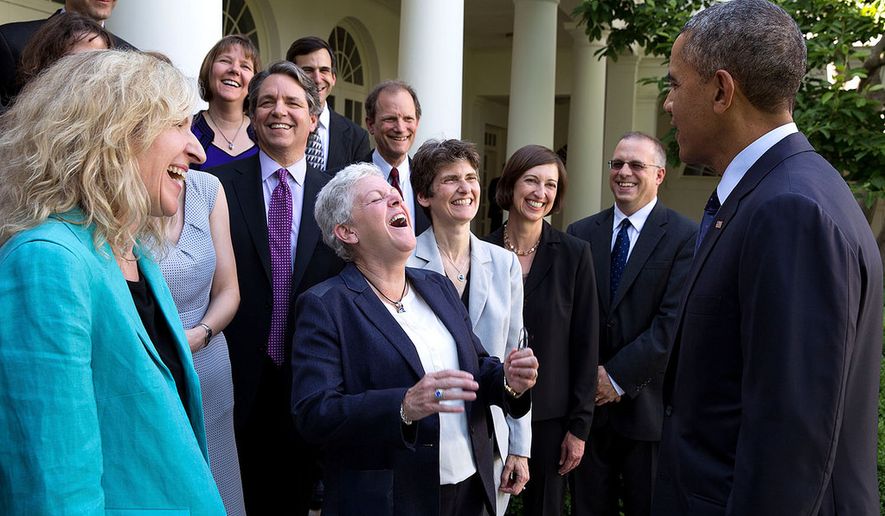The Obama administration backed off its so-called ethanol mandate Monday, dealing a blow to President Obama’s promise of a green energy revolution just as he and other world leaders opened a new round of historic climate change talks in Paris.
The Environmental Protection Agency’s latest round of ethanol mandates — known as the Renewable Fuel Standard (RFS) and initiated during President George W. Bush’s time in office — came under fire from all sides, with proponents of ethanol blending saying the rules fall far short of what the nation needs to continue cutting greenhouse gas emissions and from critics who say the entire system is flawed and must be scrapped.
The regulations call for at least 18.11 billion gallons of renewable fuels to be blended into the nation’s gasoline supply in 2016, significantly above the 17.4 billion gallons initially proposed earlier this year but far below the 22.3 billion-gallon requirement set by Congress in 2007 legislation.
Blending homegrown ethanol into gasoline, supporters say, helps reduce emissions and cut American dependence on foreign fuel. But the standards have run into practical problems, most notably the fact that most automobiles and gas stations aren’t equipped to handle fuel containing more than 10 percent ethanol — a problem commonly referred to as the “blend wall.”
Inability to overcome that blend wall is the main reason EPA has been unable to meet the congressionally mandated ethanol levels and, at this point, is essentially ignoring federal law.
Still, EPA says its most recent figures will require the blending of more than 10 percent ethanol into gasoline, and administration officials are confident that can be done.
“We think there will be increased availability of fuels … that can increase the amount of renewable fuel that gets into the system,” Janet McCabe, EPA’s acting assistant administrator in the Office of Air and Radiation, told reporters.
The standards are a key piece of the administration’s broader climate agenda and have helped the U.S. reduce its emissions. In Paris this week Mr. Obama is both pushing governments worldwide to adopt an unprecedented international deal to fight global warming while also touting the U.S. pledge to cut its overall emissions by at least 26 percent by 2025.
“Over the last seven years, we’ve made ambitious investments in clean energy and ambitious reductions in our carbon emissions. We’ve multiplied wind power threefold and solar power more than twentyfold, helping create parts of America where these clean power sources are finally cheaper than dirtier, conventional power,” Mr. Obama said at the outset of the climate change conference Monday.
“We’ve invested in energy efficiency in every way imaginable. We’ve said no to infrastructure that would pull high-carbon fossil fuels from the ground, and we’ve said yes to the first-ever set of national standards limiting the amount of carbon pollution our power plants can release into the sky,” he said.
But in Paris and at home in the U.S., critics launched a coordinated attack on both Mr. Obama’s broader climate change agenda and the Renewable Fuel Standard.
Of the RFS, key lawmakers and oil-and-gas industry groups, among others, said the standards have failed miserably.
“The Renewable Fuel Standard as a whole is remarkably flawed. The premise of this program was based on a number of assumptions that no longer reflect reality, like gasoline demand,” said Sen. James M. Inhofe, Oklahoma Republican and chairman of the Senate Committee on Environment and Public Works, pointing out that the EPA has failed to meet numerous congressionally mandated deadlines.
The agency, for example, only retroactively finalized the 2014 ethanol figures Monday.
Fossil fuels sector groups say the EPA is off-base in assuming more ethanol can be blended into gas supplies.
“EPA’s final rule relies on unrealistic increases in sales of higher ethanol fuel blends despite the fact that most cars cannot use them. Motorists have largely rejected these fuels,” said Jack Gerard, president and CEO of the American Petroleum Institute.
Meanwhile, Mr. Obama’s opponents are taking concerted steps to fight the administration’s environmental agenda as the two-week Paris conference kicks off.
On Capitol Hill the House this week will vote on resolutions disapproving of the EPA’s Clean Power Plan, which sets the first national limits on carbon pollution from power plants and forms the basis of the president’s broader global warming agenda.
In addition, the American Petroleum Institute on Monday launched a new website, climatechangeandenergy.com, which focuses on the fact that the U.S. energy sector has been able to lower greenhouse emissions significantly without federal mandates.
The conservative advocacy group the Committee for a Constructive Tomorrow announced Monday it will hold a screening of a new documentary, “Climate Hustle,” in Paris on Dec. 7. The organization says the film focuses on the “propaganda” of climate change claims.
Also, House Majority Leader Kevin McCarthy over the weekend penned an op-ed for Reuters saying that Mr. Obama is wrong to push a new global climate change deal and should instead focus on the fact that the U.S. oil-and-gas industry has created millions of jobs in recent years, lowered its own emissions and helped America move toward true energy independence.
“President Barack Obama is poised to repeat his history of weak-handed negotiations on the world stage when nearly 200 countries gather in Paris on Monday to consider an international response to climate change. According to the president, rejecting the Keystone XL oil pipeline and piling regulations on the fossil fuel and power industries in the United States are necessary to preserving America’s credibility as a leader on the world stage,” Mr. McCarthy wrote.
“But by doing this, Obama ignores the strongest card in America’s hand as he steps to the table: the advances our energy sector has made to reduce carbon emissions while simultaneously acting as the lone bright spot in our economy,” he said.
• Ben Wolfgang can be reached at bwolfgang@washingtontimes.com.




Please read our comment policy before commenting.